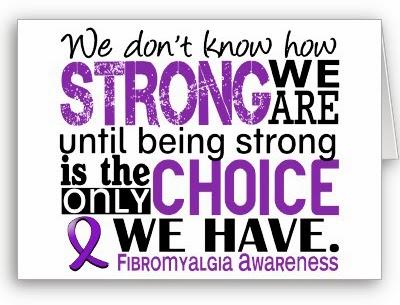Today I am beginning regular slot that looks at specific diseases/conditions, that often come secondary to SLE Lupus. As this regular slot goes on I shall also be including other chronic diseases and autoimmune conditions such as Chrons Disease and MS. The purpose of these posts is simply to educate, offer help where I can and hopefully, raise awareness of chronic illness as a whole - there are too many that are simply under the radar.
So for the first post I am going to look at a disease that I know a little something about - Fibromyalgia.

What is Fibromyalgia?
Fibromyalgia or Fibromyalgia syndrome (a name that I personally hate) is a long term, chronic pain condition that can affect the entire body. As with Lupus, there is not an amazing amount of information available about the condition, but some believe it causes pain at certain pressure points within the body and others suggest in can affect anywhere it chooses.
A long with widespread pain, it also causes extreme fatigue which is just as debilitating as the pain in many ways. Much like the fatigue from Lupus, this is not simply tiredness; the only feeling that comes vaguely close is the tiredness you get with a very bad case of the flu. However this isn't quite close enough.
Other symptoms of Fibromyalgia include;
- Irritable Bowel Syndrome
- Sleep disturbances - sometimes caused by pain and sometimes caused by the disease itself.
- Headaches
- Muscle stiffness and/or weakness
Fibromyalgia is not an autoimmune disease, meaning the markers that will be in your blood work for Lupus etc will not be present in this disease. This doesn't mean that it is not as hard to live with as a condition like Lupus and can actually make it harder to treat.
What is the cause?
Well that is the 50 million dollar question. Every doctor I have spoken too, or website I have visited has slightly differing theories - much like they do about CFS and Lupus etc. There are 3 resounding reasons that tend to come through though - these are;
- Disturbed sleep pattern or an unhealthy sleep pattern
- Low levels or certain hormones
- Disturbed pain messages
Personally I believe that there are many conditions that have not been explored enough to determine an official cause and this is one of those diseases. Often this is the hardest thing to accept at diagnosis - that you wont be given a reason as too why this is happening to you. Let's get people talking and maybe we can all have more definitive answers.

How is it treated?
Firstly, Fibromyalgia is a chronic condition meaning that there is no cure for it. So treatment is about managing the symptoms rather than ridding you of it - something that is not easy to understand sometimes, trust me I know.
When you are diagnosed, your Rheumatologist/GP will go through the options that are available to you and each case will be on a personal basis. There are some constants though - such as pain management, something that is very much needed.
- Painkillers - NSAID's such as Naproxen are often given at first, especially if you have swollen joints too. Other painkillers include, Co-codamol, Tramadol and Ibruprofen. What combination of drugs you will get will be based solely on your constant level of pain and always be sure to ONLY take the amount you are prescribed.
- Antidepressants - this form of medication is not prescribed in order to make depression easier, they are given in order to boost the levels of certain neurotransmitters in the brain. It is believed that the condition can be caused by low levels of certain transmitters, such as serotonin can cause Fibromyalgia, so raising the levels could help to ease the pain.
Physiotherapy and self help
Along with drug based treatments there are also some things that you can do to help alleviate the symptoms - not everything will work for you, but some may.
- Physiotherapy
- Yoga
- Swimming gently
- Walking gently
- Diet - look at a high fish diet
In terms of exercise, make sure you only do what your body tells you you CAN do. There is no point in pushing it to the limits and suffering for it for days. Learn the signs that say you have done enough and never feel bad about not doing as much as others - every little bit counts.
Fibromyalgia is very common for people with SLE. So don't be afraid if you are told that you have this alongside your Lupus. As a stand alone disease it is said to affect - 1 in 20 people worldwide.
*Information from NHS UK and Arthritis Research UK
